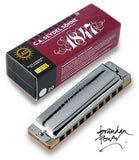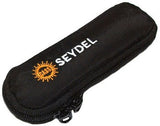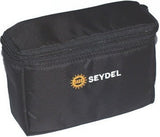Seydel 1847 CLASSIC Power Draw 16201PD includes Free USA Shipping
These are considered configured harps and can take about 3 weeks to arrive to you if not in stock. IN STOCK NOW NON valved Version 1A, 1Bb, 2D, 1G, 1LF Please feel free to confirm.
If you add valves it will take up to three weeks for delivery. Seydel will install your valves and ship direct to you. Info on Valves available here.
1847 CLASSIC in PowerDraw Tuning: same as normal in holes 1-6, but it lets you really wail in the upper register!
The 1847 CLASSIC PowerDraw, a harmonica that combines tradition and innovation. With its super airtight design and SEYDEL's unique Stainless Steel reeds, this harp really shows its expressive potential throughout the range in PowerDraw tuning. Think of it as the Big Six Plus!
PowerDraw tuning is easy to learn because:
- The bulk of the harp (holes 1-6) stays exactly the same, so there is no need to re-learn anything in that meat and potatoes range you’re so accustomed to.
- The breathing pattern of holes 1-6 (blow reed low, draw reed high in each hole)is retained all the way up to hole 10 on the PowerDraw. This gives the top octave an instant feeling of familiarity to anyone who tries it, because the techniques and riffs that work so well lower down work up there too (click on "Tone Table" above).
- Simplified Technique: There are no blow bends and no overdraws needed in the PowerDraw tuning. Two of the most important ‘blue’ notes in 2nd position (the flat third, which was overblow 6) and the flat fifth (overdraw 7) are now simple draw bends on holes 7 and 8.
- Every draw note bends from hole 6-10, soulful and easy! In un-valved setup every hole overblows, and the upper octave overblows are much easier than the overdraws necessary in Richter tuning.
- PowerDraw works well with the chordal octave-playing approach of tongue blockers. The notes in the top octave are similar to Richter, but the intervals are different. Because the chord splits sound nice and in-key, it is easy to adapt to.
- The PowerDraw works great in other positions too, especially Third (nice useful bends in the top octave), Fifth (good expression in the top end), Second Position Minor (no need to overblow to get the flat 3rd ), Eleventh and Twelfth (great expression in the top octave).
If you feel familiar with playing in holes 1-6 on Richter diatonic already (or you play our BIG SIX model), the PowerDraw is a good choice for you!
|
blow |
C4 |
E4 |
G4 |
C5 |
E5 |
G5 |
A5 |
C6 |
E6 |
A6 |
|
Hole |
1 |
2 |
3 |
4 |
5 |
6 |
7 |
8 |
9 |
10 |
|---|---|---|---|---|---|---|---|---|---|---|
|
draw |
D4 |
G4 |
B4 |
D5 |
F5 |
A5 |
B5 |
D6 |
G6 |
C7 |











